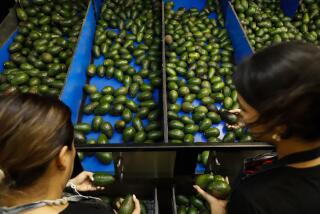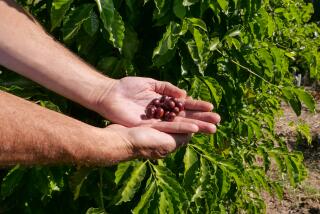Avocado Rooted Well In Area Groves, Hearts and Palates
- Share via
One need only travel the back roads of Vista, Fallbrook, Escondido or points east to realize that avocados mean big business in North County.
Half the avocados grown in California come from San Diego County, according to local avocado expert Steve White. White is president of S. L. White Farms and a farm manager, grower and former member of the California Avocado Commission.
This year’s crop is likely to be a good one, he said, despite the shock of freezing weather in December.
“We weren’t terribly affected by the freeze. It’s our fourth one in the last five years,” he said. White believes that wind machines he recently installed in some of his groves helped limit damage. “Trees in poor condition were the most hit. Our crop this year will depend on the rainfall.”
Charlie Wolk of Fallbrook represents the independent growers of District 2 on the avocado commission.
Although North County was spared the heavy freeze damage felt in other parts of California, it’s a relative point, he said.
Although only a 3% to 5% crop loss was reported in the county in all commodities, some local avocado groves were devastated. Wolk and White agreed that a major factor in loss is the condition of the trees when the freeze hits.
Two popular varieties of avocado grown in North County are the Hass and the Fuerte.
A rough, pebbly skin distinguishes the Hass from the smoother, pear-shaped Fuerte. Fuertes are considered green-skinned fruit, meaning they remain green even when they are ripe and feel soft to the touch, while the bumpy Hass turns purplish-black.
Fuertes are in season from December through March, while the Hass is grown from January to July, with the peak of its season February through June.
White grows primarily Hass avocados because they are the most profitable and take shipping better than the Fuerte.
Like many growers, Wolk hedges a little when asked which variety he favors.
“Because I’m around avocados so much, I’m pickier than most,” he said. “Some avocado connoisseurs can distinguish between a Fuerte and a Hass, but many can’t. The subtle difference in the fruit’s taste depends a lot on the time it’s harvested.”
George and Rosalyn Golinsky typify many of the area’s smaller growers. Their 5 acres of rolling hills in Bonsall shelter more than 600 trees, most of them more than 15 years old. The Golinskys, who grew up on farms in Canada, grow Hass exclusively.
“We think that’s the best kind. We do it all ourselves, except for the picking,” said Rosalyn, who manages the grove. “The frost didn’t affect our trees, thank goodness,” and they expect a record crop this year.
When asked how she prefers to eat her favorite fruit, Rosalyn doesn’t hesitate: “I like it for breakfast with toast and mayonnaise. It’s a little fattening, but I love it!”
The Cooperative of Certified Organic Growers’ small packing shed in Rainbow teems with activity at this time of year.
Rich Hart is executive director of the co-op, an organization representing the owners of more than 100 acres of organically grown Hass and Fuerte avocados in north San Diego and southern Riverside counties.
Upon arrival, avocados are weighed according to industry standards and brushed off gently to “shine them up,” Hart said. The delicate fruit is then presorted by machine, then by hand before being boxed.
By state law, each box must contain a minimum of 25 pounds. Brokers and distributors throughout California then ship them to various parts of the United States. Hart said the cooperative, which is nonprofit, caters to smaller growers.
“Because we’re organic, our avocado prices average $6 to $8 (a box) above that given to commercial packers,” he said, adding that prices vary on a daily basis.
Co-op growers often take an intense personal interest in the venture.
“We wanted to establish a place that the growers could call home,” Hart said. “Some of them come to the shed to watch their fruit being packed.”
The co-op, established in February, 1989, now represents upward of 60 growers and projects a membership of 100 for this year. There is a one-time $25 membership fee, and growers are charged $40 for the annual inspection by an independent inspector who verifies the grower is adhering to organic standards.
To ripen avocados, store them in a paper bag at room temperature for a few days. Ripe avocados should be refrigerated until they are eaten, but not longer than five days.
The following is the nutrition information for half an avocado, as stated by the California Avocado Commission: no cholesterol, 548 grams of potassium, 10.5 grams of sodium, 150 calories. Avocados are rich in monounsaturated fat.
Additional information is available from the California Avocado Commission, 1251 E. Dyer Road., Suite 200, Santa Ana, Calif. 92705. (714) 558-6761.
LOCALLY GROWN AVOCADOS
Cooperative of Certified Organic Growers Inc., 5115 5th St., Rainbow, Calif. 92028. 728-2905. Price fluctuates daily, but Hass run about $45 for a 25-pound box; Fuertes run about $28 for a 25-pound box.
Cooperative organic avocados are also available at local natural food stores:
Casady’s Whole Foods Market, 449 Encinitas Boulevard, No. 334, Encinitas, 92024. 436-3663. About $1.19 each, according to availability.
Cream of the Crop, 2009 S. Hill Street, Oceanside, 92054. 433-2757. Price fluctuates around $1.29 per fruit.
George and Rosalyn Golinsky, 721-7672. Price varies with market price. Hass sell for 75 cents each at the Vista and Escondido farmer’s markets. Will pick to order in 25-pound boxes.
Steve White, S. L. White Farms Inc., P.O. Box 3357, Escondido, Calif. 92033. 751-0805. Sells through packing houses only.
More to Read
Sign up for The Wild
We’ll help you find the best places to hike, bike and run, as well as the perfect silent spots for meditation and yoga.
You may occasionally receive promotional content from the Los Angeles Times.






